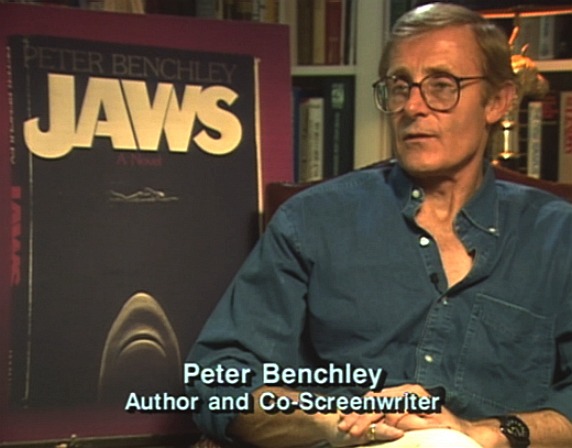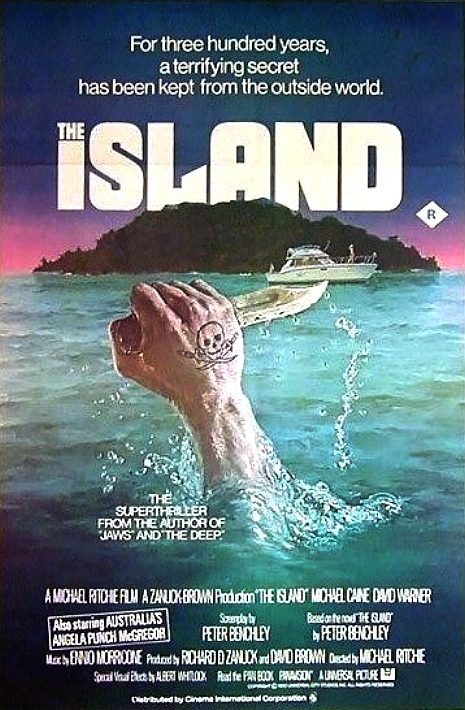|
Peter Bradford Benchley (May 8, 1940 – February 12, 2006) was an
American author, best known for his novel
Jaws and its subsequent film adaptation, the latter co-written by Benchley (with Carl Gottlieb) and directed by
Steven
Spielberg. Several more of his works were also adapted for cinema, including The Deep and The Island. 
EARLY
LIFE
He was the son of Marjorie (née Bradford) and author Nathaniel Benchley and grandson of Algonquin Round Table founder Robert Benchley. His younger brother, Nat Benchley, is a writer and actor. Peter Benchley was an alumnus of The Allen-Stevenson School, Phillips Exeter Academy, and Harvard University.
After graduating from college, he worked for The Washington Post, then as an editor at Newsweek and a speechwriter in the White House for President Lyndon
Johnson.
He developed the idea of a man-eating shark terrorizing a community after reading of a fisherman catching a 4,550 pound great white
shark off the coast of Long Island in 1964. He also drew some material from the tragic Jersey Shore
shark attacks of 1916.
JAWS
Doubleday editor Tom Congdon saw some of Benchley's articles and invited Benchley to lunch to discuss some ideas for books. Congdon was not impressed by Benchley's proposals for non-fiction but was interested in his idea of a novel about a great white shark terrorizing a beach resort. The idea was inspired by the several great white sharks caught in the 1960s off Long Island and Block Island by the Montauk charterboat captain Frank
Mundus. Congdon offered Benchley an advance of $1,000 leading to the novelist submitting the first 100 pages. Much of the work had to be rewritten as the publisher was not happy with the initial tone. Benchley worked by winter in a room above a furnace company in Pennington, New Jersey, and in the summer in a converted turkey coop in Stonington,
Connecticut.
Jaws was published in 1974 and became a great success, staying on the bestseller list for some 44 weeks. Steven Spielberg has said that he initially found many of the characters unsympathetic and wanted the shark to
win. Book critics such as Michael A. Rogers of Rolling Stone Magazine shared the sentiment but the book struck a chord with readers.
Benchley co-wrote the screenplay with Carl Gottlieb (along with the uncredited Howard Sackler and John Milius, who provided the first draft of the memorable USS Indianapolis speech) for the Spielberg film released in 1975. Benchley made a cameo appearance as a news reporter on the beach. The film, starring Roy Scheider, Robert Shaw, and Richard Dreyfuss, was released in the summer season, traditionally considered to be the graveyard season for films. However,
Universal Studios decided to break tradition by releasing the film with extensive television advertising. Tautly edited by Verna Fields, featuring an ominous score by John Williams and infused with such an air of understated menace by director
Steven Spielberg that he was hailed as the heir apparent to "Master of Suspense" Alfred Hitchcock, Jaws became the first film to gross over $100 million in US theatrical rentals. It eventually grossed over $470 million worldwide. George Lucas used a similar strategy in 1977 for
Star Wars which broke the box office records set by Jaws, and hence the summer blockbuster was
born.
The film spawned three sequels, none of which matched the success of the original critically or commercially, two video games,
"Jaws" in 1987 and "Jaws Unleashed" in 2006; both met with mostly negative critical attention. The film was also adapted into a theme park attraction at Universal Studios Florida (in Orlando, Florida and
Hollywood, California), and two musicals: "JAWS The Musical!", which premiered in the summer of 2004 at the Minnesota Fringe Festival; and "Giant Killer Shark: The Musical", which premiered in the summer of 2006 at the Toronto Fringe Festival.
Benchley estimated that he earned enough from book sales, film rights and magazine/book club syndication to be able to work independently as a film writer for ten
years.

Subsequent career
His reasonably successful second novel, The Deep, is about a honeymooning couple discovering two sunken treasures on the Bermuda reefs—17th century Spanish gold and a fortune in World War Two-era morphine—who are subsequently targeted by a drug syndicate. This 1976 novel is based on Benchley's chance meeting in Bermuda with diver Teddy Tucker while writing a story for National Geographic Magazine. Benchley co-wrote the screenplay for the 1977 film release, along with Tracy Keenan Wynn and an uncredited Tom Mankiewicz. Directed by Peter Yates and starring Robert Shaw, Nick Nolte and Jacqueline Bisset, The Deep was a moderate success, and one of the Top 10 highest grossing films in the US in 1977, though its box office tally fell well short of Jaws.
The Island, published in 1979, was a story of descendants of 17th century pirates who terrorize pleasure craft in the Caribbean, leading to the
Bermuda Triangle mystery. Benchley again wrote the screenplay for the film adaptation. But the film version of The Island, starring
Michael Caine and co-starring David Warner, failed at the box office when released in 1980.
During the 1980s, Benchley wrote three novels that did not sell as well as his previous works. However, Girl of the Sea of Cortez, a beguiling John Steinbeck-type fable about man's complicated relationship with the sea, was far and away his best reviewed book and has attracted a considerable cult following since its publication. Sea of Cortez signposted Benchley's growing interest in
ecological issues and anticipated his future role as an impassioned and intelligent defender of the importance of redressing the current imbalance between human activities and the marine environment. Q Clearance published in 1986 was written from his experience as a staffer in the Johnson White House. Rummies (aka Lush), which appeared in 1989, is a semi-autobiographical work, loosely inspired by the Benchley family's history of alcohol abuse. While the first half of the novel is a relatively straightforward (and harrowing) account of a suburbanite's descent into alcoholic hell, the second part—which takes place at a
New Mexico substance abuse clinic—veers off into wildly improbable thriller-type territory.
He returned to nautical themes in 1991's Beast written about a giant squid threatening Bermuda. Beast was brought to the small screen as a made-for-television film in 1996, under the slightly altered title The Beast. His next novel, White Shark, was published in 1994. The story of a
Nazi-created genetically
engineered shark/human hybrid, failed to achieve popular or critical success. It was also turned into a made-for-television film titled Creature, with Christopher Lehmann-Haupt of the New York Times saying it "looks more like
Arnold Schwarzenegger than any
fish". In 1999, the television show Peter Benchley's Amazon was created, about a group of plane crash survivors in the middle of a vast jungle.
In the last decade of his career, Benchley wrote non-fiction works about the sea and about sharks advocating their conservation. Among these was his book entitled Shark
Trouble, which illustrated how hype and news sensationalism can help undermine the public's need to understand marine ecosystems and the potential negative consequences as humans interact with it. This work, which had editions in 2001 and 2003, was written to help a post-Jaws public to more fully understand "the sea in all its beauty, mystery, and
power." It details the ways in which man seems to have become more of an aggressor in his relationship with sharks, acting out of ignorance and greed as several of the species become increasingly threatened by
overfishing.
Benchley was a member of the National Council of Environmental Defense and a spokesman for its Oceans Program:
"The shark in an updated Jaws could not be the villain; it would have to be written as the victim; for, worldwide, sharks are much more the oppressed than the
oppressors."
He was also one of the founding board members of the Bermuda Underwater Exploration Institute
(BUEI).
Peter Benchley died of pulmonary fibrosis in 2006.
WORKS
BY PETER BENCHLEY Fiction
Jaws (1974)
The Deep (1976)
The Island (1979)
The Girl of the Sea of Cortez (1982)
Q Clearance (1986)
Rummies (1989)
Beast (1991)
White Shark (1994; republished as Creature in 1997)
Non-fiction
1964: Time and a Ticket
1970: Life's Tempo on Nantucket
1994: Ocean Planet: Writings and Images of the Sea
2001: Shark Trouble: True Stories About Sharks and the Sea
2002: Shark!: True Stories and Lessons from the Deep
2005: Shark Life: True Stories About Sharks and the Sea (with Karen
Wojtyla)
Film
Jaws, 1975 film adaptation; actor: Interviewer.
The Deep, 1977 film adaptation
Jaws 2, based on characters from Jaws
The Island, 1980 film adaptation
Jaws 3-D (a.k.a. Jaws 3), based on characters from Jaws
Jaws: The Revenge, a fourth film based on characters from Jaws
Dolphin Cove, 1989 TV series
The Beast, 1996 television film adaptation
Creature, 1998 television film adaptation
Amazon, 1999 TV series
Mrs. Parker and the Vicious Circle, 1994 (actor, as Frank Crowninshield)
LINKS
NOVELIST
INDEX
A - Z
|
D - Youtube
|
M - Youtube
|
|
D - Youtube
|
M - Youtube
|

A
taste for adventure

A
heartwarming adventure: Pirate
whalers V Conservationists
with
a £Billion dollars riding on the conclusion
GRAPHIC
NOVEL INDEX
A - Z
|

